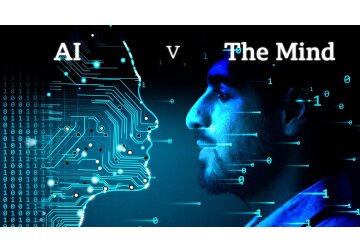
How AI is testing the boundaries of human intelligence
Welcome to AI v the Mind, a new series from the BBC that will explore the limits of artificial intelligence by pitting it against the most powerful thinking machines on the planet – the human brain.
It can spot signs of cancer that doctors often miss, appear to wax lyrical about how it "feels", decipher ancient texts that have flummoxed researchers, predict the weather and even help us unravel animal communication. In many respects, artificial intelligence (AI) has become so advanced it's more interesting to examine the things it can’t do.
Despite AI's world-bending abilities, machines still pale in comparison to the human mind on a host of tasks. Even algorithms built to replicate the function of the human brain – known as neural networks – are relatively unsophisticated compared to the inner workings of our minds.
"A grand mystery in the study of intelligence is what gives us such big advantages over AI systems," says Xaq Pitkow, an associate professor at Carnegie Mellon University who studies the intersection of AI and neuroscience. "The brain has a lot of deep neurological structures related to different functions and tasks, like memory, values, movement pattens, sensory perception and more." These structures let our minds dip into different kinds of thinking to solve different kinds of problems. It's what gives humanity the edge over the robots, for now.
The AI algorithms that dominate the market are essentially prediction machines. They crunch massive amounts of data and analyse patterns, which allows them to identify the most likely answer to a given question. On a fundamental level, much of human cognition centres around prediction, too, Pitkow says, but the mind is built for levels of reasoning, flexibility, creativity and abstract thinking that AI still hasn't replicated.
AI works well enough that conversations with chatbots, like ChatGPT or Google's Gemini, can feel like talking to a real human being who can deliver plausible – if often inaccurate – answers to any question. But just how capable are modern AIs? Even the people who build this technology aren't always sure of its limitations.
Think about social problems, such as having to apologise to someone you have offended. Is AI ready to take the job of a talented musician? What about telling a joke, or coming up with a creative recipe? Chefs and comedians spend years honing their skills in these areas through practice, instinct and trial and error. How would a machine measure up, and why?
These are the questions AI v the Mind will answer. In this ongoing series, we'll probe a different aspect of human cognitive abilities each month to see how an AI compares. We will pit a human expert against an AI tool on key tasks – can a machine write a better joke than a professional comedian, or unpick a moral conundrum more elegantly than a philosopher?
This series will aim to explore just where the limits of cutting-edge AI lie, and learn a little about how our own brains work along the way.
Bbc.com







